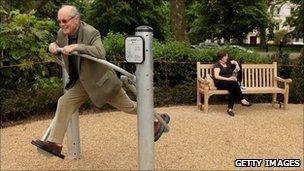Life expectancy rises again, ONS says
- Published

Longevity is still improving everywhere in the UK
Life expectancy has continued to rise, according to the latest figures from the Office for National Statistics.
In 2010, average life expectancy at birth across the UK, for both men and women, rose by another four months to 78.2 and 82.3 years respectively.
At the same time, average life expectancy at age 65, for both men and women, rose by two months.
The ONS said its figures also revealed a widening gap between areas with the lowest and highest life expectancies.
"The gap between the local areas with the highest and lowest life expectancies increased between 2004-06 and 2008-10," the ONS said, external.
"Life expectancy was highest in Kensington and Chelsea and lowest in Glasgow City in each period between 2004-06 and 2008-10."
Pensions
Increased longevity suggests that the health of the general population is still improving.
The trend of increasing life expectancy is nothing new and has been going on for decades.
However, the full impact, particularly on the finances of pension schemes, has only been widely appreciated in the past 10 years or so.
The coalition government has repeatedly highlighted the growth in longevity to justify its plans to accelerate the raising of the state pension age, as well as its proposed changes to the various public sector pension schemes to cut their long-term costs.
Crucially, there appears to be no let-up in the speed at which longevity is increasing.
More improvement
The latest ONS figures are based on existing mortality rates and do not include any assumptions about further improvements.
"These life expectancies show how long people would on average live if recent mortality rates continued indefinitely. But they won't," said Matthew Fletcher of Towers Watson.
"How things change in future, and how these improvements are distributed across local areas, will have a big impact," he added.
The figures show that:
at birth men in the UK can now expect to live, on average, to 78.2 years, while women will live to 82.3 years.
at age 65, the average man in the UK can expect to live a further 18 years while the average woman can expect to live another 20.6 years.
across the UK, life expectancy is highest in England, particularly in the southern areas, and lowest in Scotland.
the biggest improvement between 2004-06 and 2008-10 was in London, with life expectancy both at birth and at age 65 rising during this time by well over a year for both men and women.
"The apparent advantage in the London region is likely to be due to a combination of factors, including the relative affluence of many parts of London, the movement into London of healthy, employed individuals at low risk of death, and the statistical effects of migration and high population mobility," the ONS explained.
Glasgow effect
Although life expectancy has continued to rise in all areas of the UK, the ONS figures highlight the dramatic difference between different areas, usually attributed to differences in social class, income, health and economic deprivation.
The figures highlight Kensington and Chelsea as having the highest male and female life expectancies at birth in the years between 2004 and 2010.
There, men during that time lived an extra 2.1 years (to 85.1 years) and women an extra 2.7 years (to 87.8 years).
The ONS said the area's population was relatively wealthy and healthy, but warned that the figures might have been skewed by the large number of people moving into and out of the area.
At the other end of the scale, Glasgow was identified as the area in the UK with the lowest life expectancy at birth.
Although longevity improved there between 2004 and 2010, the improvement was still slower than in Kensington and Chelsea.
With Glasgow men now living to 71.6 years and women to 78 years, men lagged their more fortunate counterparts in Kensington and Chelsea by 13.5 years and women by 11.8 years.
The ONS pointed out that academic research published in 2007 suggested that as while this is due to measurable social, economic and health differences, compared to even other parts of Scotland, there is a specific "Glasgow effect" which leads to a higher death rate and lower life expectancy.